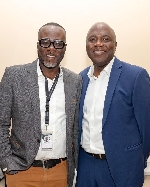Cyber security investment key to Ghana’s 24-Hour economy and investor confidence
 Mr Simon Madjie
Mr Simon Madjie
Ghana’s ambition to be Africa’s trusted investment hub will depend as much on cybersecurity as on infrastructure or policy reforms.
Across the continent, the Interpol Africa Cyberthreat Assessment Report estimates that more than 3 billion dollars have been lost to Cyber incidents between 2019 and 2025. Sectors most affected include finance, healthcare, energy and government services.
In August, Interpol and African investigators recovered nearly 100 million dollars from suspected fraudsters.
While important, this figure is only a fraction of the wider losses, underlining the urgent need for stronger investment in cyber resilience.
Ghana’s progress and recognition
At the launch of the 2025 National Cyber Security Awareness Month, Chief Executive Officer (CEO) of Ghana Investment Promotion Centre (GIPC), Mr Simon Madjie (Esq.) reminded stakeholders that every cyber security attack is not just a technical glitch but a threat to capital, markets and long-term investor confidence.
The event, held in Accra under the theme “Building a Safe, Informed and Accountable Digital Space,” highlighted how rising cyber-attacks disrupt markets, weaken livelihoods and undermine jobs.
Citing the World Bank’s Review of the Economic Cost of Cyber Incidents, Mr Madjie explained the global cost of cybercrime is projected to reach 10.5 trillion dollars annually by 2025, nearly 10 per cent of the World’s Gross Domestic Product.
“A single cyber-attack not only damages systems. It shakes investor confidence, disrupts businesses and affects families who depend on digital trade for their survival,” he warned.
Despite these challenges, the GIPC CEO indicated that Ghana has registered notable achievements.
In the 2024 Global Cyber Security Index published by the International Telecommunication Union, Ghana scored 99.27 per cent and secured Tier 1 status. This places the country among only 46 nations globally and five in Africa recognised as role models in cybersecurity development.
For GIPC, this milestone provides a strong foundation. But as Mr Madjie stressed, complacency is not an option. “We must view cyber security not as a cost but a strategic investment that protects our digital assets, unlocks opportunities and positions Ghana as a trusted digital hub in Africa,” Mr Madjie(Esq.) said.
He called for stronger partnerships across civil society, industry and government. He reaffirmed the centre’s commitment to working with the Cyber Security Authority and other stakeholders to build a secure, trusted and strong digital ecosystem.
“Cyber security is the backbone of investor confidence and sustainable growth in the digital age. Together, let us ensure Ghana remains a secure and competitive investment destination and a continental leader in innovation,” he stressed.
Protecting investor data at GIPC
As the government agency responsible for facilitating investment, GIPC has made the protection of investor data a priority. Guided by the Data Protection Act, 2012 (Act, 843), the Centre has strengthened its systems and adopted international best practices to safeguard sensitive information.
The Data Protection Commission (DPC) provides channels for reporting breaches. Regular anti-scam advisories further protect investors. These measures demonstrate GIPC’s commitment, not only attracting investment but also safeguarding the integrity of investor data.
GIPC applies a layered framework build on secure database, restricted access, and staff training. In July 2025, Mr Madjie met with Dr Arnold Kavaarpuo, Executive Director of DPC, to reinforce compliance with Act 843.
Cyber security and the 24-Hour economy
The focus on cyber security also resonates with President John Dramani Mahama’s vision of building a 24-hour economy. For businesses to operate seamlessly around the clock, digital platforms must be secure and reliable. Without strong cyber protection, financial systems, logistics chains and e-commerce platforms would remain vulnerable to disruption.
Investment in cyber flexibility therefore becomes a basis of the 24-hour economy. It guarantees continuity of services, protects digital trade and ensures that businesses, whether local or international, can operate with confidence at all times.
Leadership and warning
As the month of October has been globally set as a period to create awareness about security, the Acting Director General (DG) of the Cyber Security Authority, Mr Divine Agbeti, is pledging continued efforts to strengthen Ghana’s cybercrime as a national security threat.
Also, the DG of the Criminal Investigations Department (CID), Ghana Police Service, COP Lydia Yaako Donkor, has repeatedly described cybercrime as a national security threat and she is absolutely right.
According to her, “The fight against cybercrime is not optional. It is essential for our survival as a modern nation”.
She has already given the assurance that her outfit has deployed Artificial Intelligence-powered platforms to track online criminals’ networks.
It is commendable that the Amber Alert Ghana system with Meta to protect missing children, has been launched.
The message of Ghana’s DG of the CID is clear: “Cyber security demands a whole-of-society approach”.
Minister of Communication, Digital Technology and Innovations, Sam Nartey George, added a sharp warning to cybercriminals, stressing that the government would not allow scammers to derail national progress or tarnish Ghana’s reputation.
Every attack is not just a theft of data but theft of jobs, opportunities and trust,” he said.
Policy perspective
For Ghana to sustain its ambition of becoming Africa’s leading investment hub, cybersecurity must be treated as a central economic policy issue.
By positioning cybersecurity as both a business enabler and a national safeguard, Ghana is aligning its investment promotion strategy with global expectations.
This alignment not only boosts investor confidence but also supports the government’s broader economic vision, including the 24-hour economy.
Cyber resilience is therefore not optional.
It is necessary for protecting livelihoods, ensuring investors' trust and safeguarding Ghana’s place in the global digital economy.
Source: Classfmonline.com
Trending News

Dr Drew says President Mahama’s UN speech inspired historic visit to Ghana
15:01
Saint Kitts and Nevis PM to visit Ghana for 69th Independence Anniversary and bilateral talks
20:36
GTDC to launch campus tourism office at UG to boost student and domestic tourism
01:27
Margins Group trains NIA staff on ethics to strengthen National ID system
12:43
SONA: Mahama’s macroeconomic claims don’t reflect reality – Bekwai MP
12:50
“Ghana is back and open for business” – Mahama
11:12
Parliament of Ghana announces details for 2026 State of the Nation Address
17:13
Oyarifa murder:Father demands justice from Mahama, IGP
06:29
Ghana’s tuna industry achieves MSC certification, boosting global market prospects
12:30
Ahiafor refers Afenyo-Markin to Privileges Committee over recruitment ‘scam’ claims after complaint by Mohammed-Mubarak
18:50



